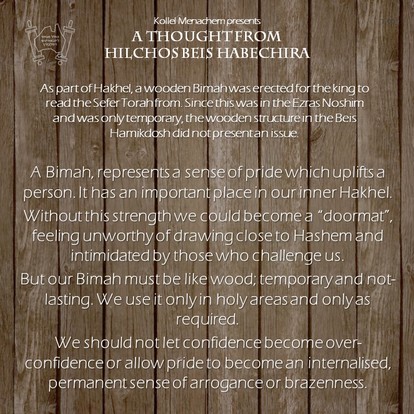
As part of Hakhel, a wooden Bimah was erected for the king to read the Sefer Torah from. The meforshim explain how it was possible to have a wooden structure when, as discussed previously, no wood could be used or built in the Beis Hamikosh.
Resolutions include that the Bimah stood in the Ezras Noshim where the prohibition did not apply since it had a lesser degree of Kedusha than the actual Azarah.
Alternatively, the issur only applies to permanent fixtures. The Hakhel Bimah only stood for a couple of days before being dismantled.
In Avodas Hashem we stress the concept of Bittul – humility and surrendering of self. Arrogance is antithetical to serving Hashem and seemingly has no place.
A Bimah, which elevates the person, represents a sense of pride, strength and upliftment. These do have an important need in our inner Hakhel; collecting the various dimensions of our lives and personalities to dedicate them to Hashem.
Without this strength we would not feel ourselves worthy of drawing close to serve Hashem. We would be intimidated by those who mock and challenge us. This pride ensures that our humility does not allow us to become the proverbial “doormat”.
But our Bimah must be of wood, something temporary and not-lasting. We use it only in the holy areas and only as required. We should not let confidence become over-confidence or allow pride to become an internalised, permanent sense of arrogance or brazenness.
Resolutions include that the Bimah stood in the Ezras Noshim where the prohibition did not apply since it had a lesser degree of Kedusha than the actual Azarah.
Alternatively, the issur only applies to permanent fixtures. The Hakhel Bimah only stood for a couple of days before being dismantled.
In Avodas Hashem we stress the concept of Bittul – humility and surrendering of self. Arrogance is antithetical to serving Hashem and seemingly has no place.
A Bimah, which elevates the person, represents a sense of pride, strength and upliftment. These do have an important need in our inner Hakhel; collecting the various dimensions of our lives and personalities to dedicate them to Hashem.
Without this strength we would not feel ourselves worthy of drawing close to serve Hashem. We would be intimidated by those who mock and challenge us. This pride ensures that our humility does not allow us to become the proverbial “doormat”.
But our Bimah must be of wood, something temporary and not-lasting. We use it only in the holy areas and only as required. We should not let confidence become over-confidence or allow pride to become an internalised, permanent sense of arrogance or brazenness.

 RSS Feed
RSS Feed
